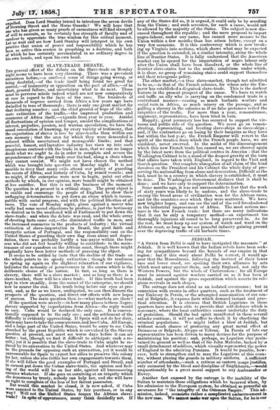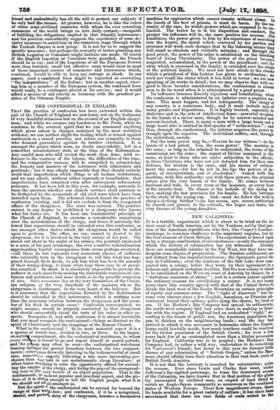JEDDAH.
"A SHEIK from Delhi is said to have instigated the massacre" at Jeddah. It is well known that the Indian rebels have been seek- ing for sympathizers beyond the bounds of our empire in that region ; but if this story about Delhi be correct, it would ap- pear that the Mussulmans, following the instinct of their lower race and lower creed, are spoiling their own alliances by acts which must array against them, not only England, not only the Western Powers, but the whole of Christendom ; for all Europe must be aroused against warfare carried on as it has been at Jeddah, and against the gross superstition which asserts its reli- gious revivals in such shapes.
The outrage does not stand as an isolated occurrence ; but in connexion with events in other quarters, such as the treatment of our Embassy in Persia, or the attempted assassination of our con- sul at Belgrade, it exposes facts which demand instant and prac- tical attention. It is obvious that British Legations in those quarters have not been able to provide that self-defence which is necessary, where the local authorities cannot undertake the duty of protection. Should the bad spirit manifested in these several attacks continue, it will not suffice to check it by chastising the criminal populations. We might inflict a blow at Jeddah, but without much chance of producing any great moral effect at Damascus or Belgrade, Aleppo or Tehran. In Persia of late our representative has been driven to many devices for the purpose of maintaining his position ; and, perhaps, no Legation ever- main- tained its ground so well as that of Sir John Malcolm, lucked by`A small detachment of soldiers, which visually represenied the power of England to the admiring Persians. It would be possible, how- ever, both to strengthen and to man the Legations of this coun- try, without placing the guards in military uniform. A sufficient number of attendants,--such a retinue as eastern i'usage justifies, only animated by the blood and discipline of Englishmen,—would unquestionably be a great moral support to any Ambassador or Envoy.
Another fact exposed by the outrage is the inability of the Sultan to maintain those obligations which he iteurred when, by his admission to the European system, he obtained so powerful an assurance for "the in of the Ottoman limpire." This ad- mission, indeed, s rather a complicated. embarrassment in the new case. We mot make war upon the Sultan, for he is our friend and undoubtedly has all the will to protect our subjects if he only had the means. At present, however, he is like the rulers of other semi-civilized countries with whom the ever extending commerce of the world brings us into daily contact,—incapable of fulfilling the obligations implied in that friendly intercourse; and his position undoubtedly suggests the expediency of some de- cisive measures to assist him in the transition stage through which the Turkish Empire is now going. It is not for us to suggest the specific measures ; but perhaps the necessity of betterg any British Legation or Consulate might indicate one mo.el.arOir course if the English Legation or Consulate were guarded, the French should be so too ; and if the Legations of all the European Powers were thus fortified, small but effective corps would exist in most of those important centres of commerce and intercourse which, combined, would be able to keep any outrage in check. In one aspect, such a cembined force might be regarded as overruling "the iadepErntbnce " of the Sultan; but in another aspect, view- inghim as a member of the European system, the combined force would really be a contingent placed at his service ; and it would afford a species of aid exactly in harmony with the practical po- sition of the Ottoman Empire.



























 Previous page
Previous page